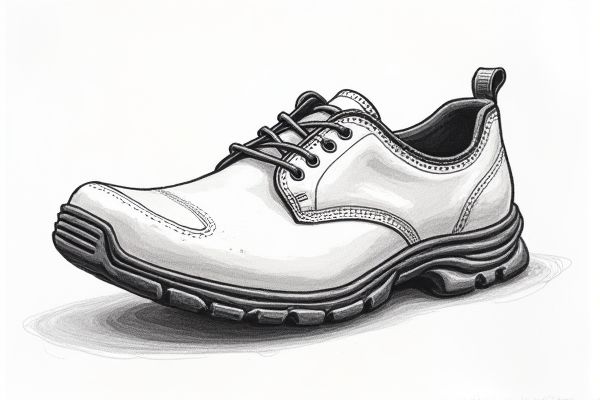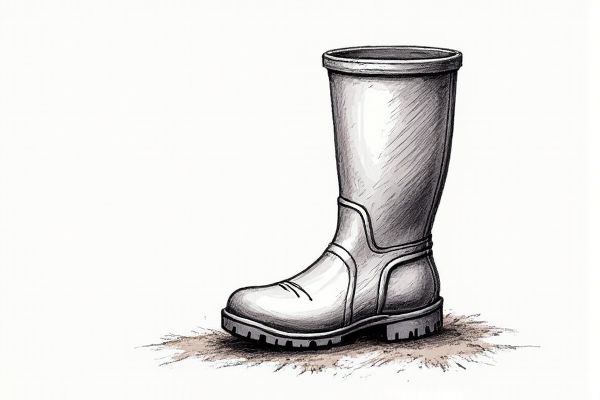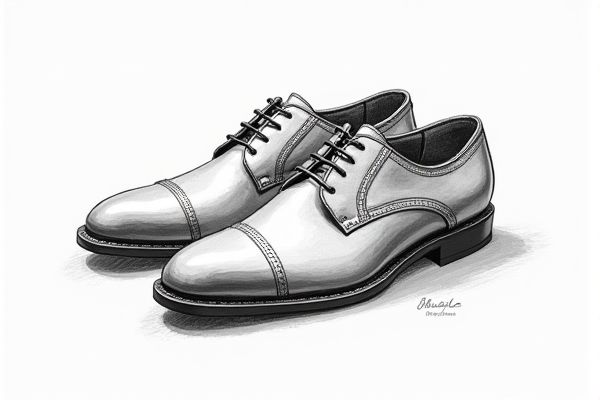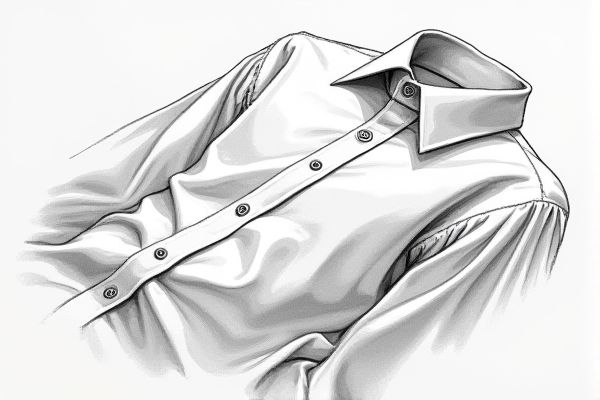In the ever-evolving world of footwear, rubber shoes have cemented their place as a go-to choice for comfort and durability. With countless brands vying for attention, it can be overwhelming to pick the right ones that deliver on both style and functionality. Through well-researched insights and customer reviews, we've curated the finest brands that are leading the charge in the rubber shoe industry. Curious to see which brands made the cut? Explore our comprehensive list below.

Illustration of rubber shoes
Best brands of rubber shoes in 2025
Nike
Nike is a paramount leader in the production of rubber shoes, holding a significant 38.2% of the total footwear market as of 2022. The company dominates the athletic footwear segment with a 30% market share and an impressive 38.5% share in the sneaker market. Notably, Nike has doubled its market share in basketball shoes from 43% in 1987 to 86% in 2019. The company produces over 800 million pairs of shoes annually, with half of its production coming from Vietnam and 27% from Indonesia. Nike's footwear segment accounts for approximately 62.5% of its global revenues. For more detailed insights, you can explore their Nike shoes statistics.
Adidas
Adidas is a leading producer of high-quality rubber shoes, notably through its successful collaboration with Continental, a partnership that has resulted in over 250 models equipped with high-performance Continental rubber since their alliance over a decade ago. In 2022, Adidas held a 15.4% market share in global athletic footwear and a 14.7% share in the sneaker market, demonstrating its strong presence in the industry. The brand's footwear segment generated $13.2 billion in revenue in 2022, a 3.1% increase from the previous year. Adidas's market share in the athletic footwear market in the US has seen fluctuations, but it managed to increase from 6.3% in 2016 to 11.3% in 2017. The brand's focus on performance-driven designs and accessible prices has contributed to its popularity. For more detailed Adidas shoes statistics, visit RunRepeat's site.
Converse
Converse, owned by Nike, is a renowned brand in the footwear industry, particularly celebrated for its iconic rubber shoes, such as the Chuck Taylor All Star. Since its inception in 1908, Converse has specialized in manufacturing high-quality rubber shoes, with over 100 million pairs of Chuck Taylors sold annually. The brand's global revenue in the year ended May 31, 2024, was approximately $2 billion, highlighting its significant market presence. Converse shoes are known for their comfort, stability, and timeless design, using natural gum rubber and cotton canvas in their production. With a strong presence in the US market, Converse is favored by 29% of American users and maintains a loyalty rate of 71% among its customers. For more detailed sales data and insights about Nike's non-Nike brands, you can explore relevant statistics.
Vans
Vans is a leading producer of rubber shoes, renowned for its skateboarding roots and global success. As of 2021, Vans held a 6.1% share of the entire US footwear market and a 7% portion of the global sneaker industry. The brand manufactured over 105 million pairs of shoes in the 2023 fiscal year, with 67% of sales driven by male consumers. Vans generated $3.7 billion in global revenue in 2023, although this marked a 12% decline from the previous year. The brand's commitment to authenticity and innovation has been crucial in its growth. For more insights on Vans' market influence and production data, visit Vans Shoes Statistics.
Puma
PUMA is a leading producer of high-quality rubber shoes, holding a 1.2% share of the global footwear market as of 2022 and a 4% share of the athletic shoe segment in the United States. The company has seen consistent revenue growth, with its footwear revenue increasing from $1.6 billion in 2014 to $4.6 billion in 2022, representing a 187.5% increase. PUMA produces approximately 35 million pairs of shoes annually and maintains a 2.1% share in the global athletic footwear market. The brand is also notable for its strong presence in basketball, being the fourth most popular basketball shoe brand in the NBA with a 3.4% average share over the past five seasons. PUMA aims to continue its growth, predicting a footwear revenue of $6.2 billion by 2030.
New Balance
New Balance, a leading producer of rubber and plastic footwear, boasts a strong presence in the global market. Having operated for 117 years, the company employs around 4,000 people and achieved a remarkable $6.5 billion in sales in 2023, up by 23% from the previous year. Holding a substantial 12% market share, tied with Reebok, New Balance is ambitiously targeting $10 billion in sales in the near future. The brand is acclaimed for its high-quality athletic shoes and apparel and has expanded its offerings with lifestyle sneakers and collaborations with notable designers. The company's production methods encompass both domestic and international manufacturing, with a significant portion of global sales supplied from contract plants in China.
Skechers
Skechers has emerged as a leading producer of rubber shoes, known for its comfort, value, and environmental responsibility. The brand has seen significant growth, with a 55.8% revenue increase from $5.3 billion in 2019 to $8.1 billion in 2023, and is projected to reach $10 billion by 2025. In 2022, Skechers held a 41% domestic market share in the US, equivalent to $1.8 billion, and its international market share was 59%, generating $4.4 billion. The company has also expanded its direct-to-consumer retail market to 38% of its total revenue in 2022, up from 28% in 2020. With over 4,700 stores globally, Skechers continues to gain traction, especially among affluent consumers and older demographics. You can find more detailed information about Skechers' market performance on their Skechers shoes statistics.
ASICS
ASICS is a leading producer of high-quality athletic footwear, holding a global market share of 8.1% and ranking as the fourth-largest athletic footwear brand worldwide. In the performance running footwear segment, ASICS maintains a significant presence with a 9.9% global market share as of 2019 and a 13.3% market share in the running shoe market as of January 2020. The brand is particularly strong in the U.S. market, accounting for approximately 6.5% of the athletic footwear market share in 2021. ASICS' commitment to innovation, such as its GEL™ technology introduced in the 1990s, has contributed to its success and popularity among athletes. With a rich history dating back to 1949 and a philosophy of "a sound mind in a sound body," ASICS continues to be a favorite among both professional and amateur athletes. For more insight into their journey and innovations, visit their ASICS Founder Story and History.
Saucony
Saucony, founded in 1898, is a renowned American brand specializing in high-quality athletic footwear, particularly running shoes, with a market share of 5% in the US footwear market as of 2023. Known for its innovative technologies such as ISOFIT and EVERUN, Saucony caters to various running needs, including trail running and racing. The brand has seen significant growth, especially in China, with a 72.2% increase in revenue in the first half of 2024. Saucony's products are designed to provide superior fit, comfort, and performance, making it a favorite among professional and casual runners alike. With over a century of experience, Saucony continues to innovate and expand its product lines.
Reebok
Reebok, once a dominant force in the sneaker industry, notably surpassed Nike in the mid-1980s with $1.82 billion in sales in 1989, driven by its innovative products like the Freestyle and Pump. Although it held a significant 10% market share in 2006, Reebok's market share has since dwindled to just 1.1% in the sports footwear space. Despite this decline, Reebok remains strong in specific markets, such as India, where it holds a 47% market share in the sports footwear and apparel category. The brand's strategic targeting of urban consumers and niche disciplines like CrossFit has helped maintain its relevance. However, Reebok faces intense competition from industry giants like Nike and Adidas, necessitating continuous product innovation to stay competitive. For more insights into Reebok's journey, visit this detailed analysis.
















Leave a Reply
Your email address will not be published.